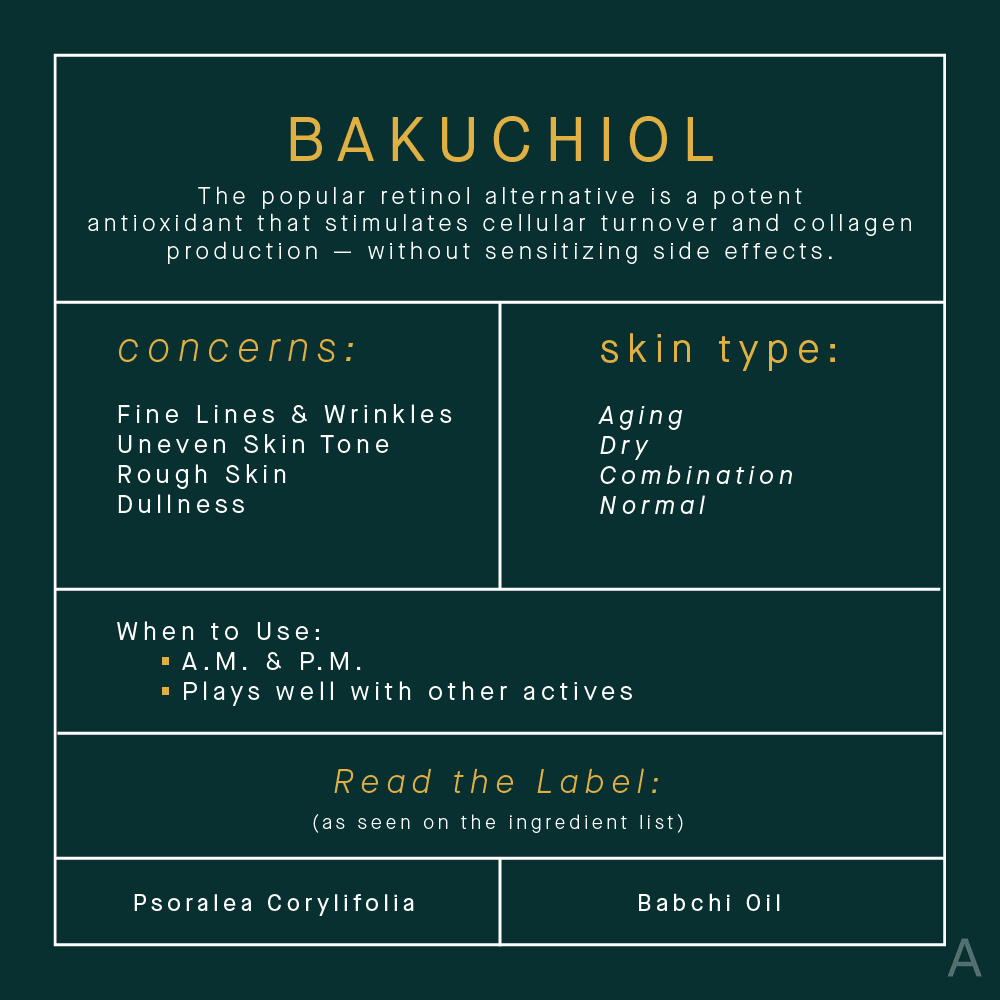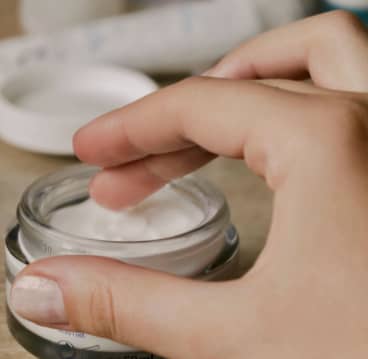 Salicylic Acid Peel
Salicylic Acid PeelRead The Label: All Your Bakuchiol Questions Answered
While retinol is the gold standard, bakuchiol offers many of the same benefits — with none of the irritation. Here’s what the experts have to say about this gentler alternative that’s likely to become your new favorite.
Feel like you need a dictionary every time you look at the ingredient list of a beauty product? Still unsure of the difference between retinol and retinoids? What about the unique benefits of vitamins B, C, and E? Are alpha and beta hydroxy acids the same thing? The skincare aisle can be overwhelming, but you don’t need a PhD in cosmetic chemistry to navigate it. With expert help, The AEDITION is demystifying and simplifying the beauty industry — one label at a time.
Topical vitamin A (a.k.a. retinol and retinoids) is often lauded for its seemingly endless skincare benefits. It’s often recommended for those looking to tackle acne, wrinkles, and/or uneven skin tone and texture concerns. Providing cumulative, long-term benefits, the multitasking active can be used from your twenties to your fifties and beyond. Sound too good to be true? For some people, it is.
While retinol and retinoids definitely live up to the hype, they can also be extremely sensitizing and irritating — causing visible flakiness, dryness, and redness and exacerbating conditions like eczema and rosacea. Plus, they don’t always work well with other active ingredients, which means you’ll probably have to alter your skincare routine while using them.
Enter bakuchiol. The all-natural, anti-ager stimulates cell turnover and boosts collagen production, allowing it to offer results that are comparable to traditional retinol. The main difference between the two lies in the fact that bakuchiol is much less irritating and generally has less of a learning curve. While bakuchiol is popping up on more and more ingredient lists, there’s a good chance you still don’t know how it works. Here, we’re offering a look into the ins and outs of bakuchiol in skincare.
What is Bakuchiol?
Bakuchiol is a meroterpene phenol (a chemical compound having a partial terpenoid structure) that is found in the seeds and leaves of the Psoralea corylifolia (babchi) plant. Native to India and Sri Lanka, the compound is named after the Sanskrit name of the herb, Bakuchi. Historically, the plant was used in traditional Ayurvedic and Chinese medicine to treat internal ailments, including prostate gland enlargement, kidney disease, and diarrhea, as well as skin conditions like vitiligo and psoriasis.
The Benefits of Bakuchiol for Skin

As it relates to the skin, bakuchiol is somewhat of a wonder ingredient. It benefits the skin in a multitude of ways:
- Reduces inflammatory
- Improves fine lines and wrinkles
- Boosts elasticity and firmness
- Brightens the skin
- Reduces dark spots and hyperpigmentation
- Triggers skin cell regeneration
The botanical can also reverse photoaging (i.e. the premature signs of aging caused by UV exposure). “It does so by inducing antioxidant pathways, meaning it helps the skin fight off free radical damage and other oxidative stress that leads to skin aging,” explains Krupa Koestline, a clean cosmetic chemist and founder of KKT Consultants.
The Best Candidates for Bakuchiol
Much like retinol/retinoids, bakuchiol can be used by a variety of skin types — from acne-prone to aging — and its versatile nature means it’s a great addition to most people’s routine. Since studies have confirmed that it’s analogous to retinol, many people opt for bakuchiol because it’s a gentler choice for those with sensitive skin or those that find traditional vitamin A to be too irritating.
“Bakuchiol is often used as a natural alternative to retinol that is less irritating and plant-derived, which is great for those who are looking for non-toxic, vegan products,” says Shuting Hu, PhD, a cosmetic scientist and founder of Acaderma. “If you are looking to use retinol but the ingredient causes too much irritation, it can also be great as a pre-introduction to retinol so that your skin can get acclimated to the product.”
Another population that can benefit from bakuchiol? “Bakuchiol is safe to use while pregnant,” she notes, adding that it is not recommended to use retinol while pregnant or breastfeeding.
Finding the Right Bakuchiol Product
When it comes to choosing a bakuchiol product, the number one factor you should consider is the potency. “If there isn’t enough concentration of bakuchiol, you won’t experience the benefits of the product,” Dr. Hu cautions. “I would recommend looking for products that have at least 0.5 percent to 1 percent concentration.” From there, consider the format. “Next, you will want to look at the formula,” she continues. “Bakuchiol is oil soluble, therefore, it is better to use a cream or oil-based formula.”
And don’t forget about how the product will complement your skin concerns and existing routine. “If you are looking for something more lightweight to wear under a moisturizer, look for a serum,” Koestline says. “For those with drier skin, a more occlusive oil with bakuchiol may be preferred.” And while pure bakuchiol can be used on the skin, it isn’t necessary — and can be antithetical to its ‘gentle’ billing. Koestline says the undiluted form of the ingredient can be irritating.
Acaderma’s forthcoming Better With Age Rejuvenating Rich Cream is a nourishing moisturizer infused with bakuchiol, shea butter, coffee seed oil, and moringa oil to hydrate the skin while stimulating collagen synthesis and cellular regeneration. The result? Visibly smoother and firmer skin. The Ambari PM Active12 Serum, meanwhile, combines bakuchiol with alpha hydroxy acids (AHAs) and polyhydroxy acids (PHAs) to resurface and clarify your skin while you sleep.
If you’re looking for an oil, the PSA Midnight Courage Night Oil helps to brighten and reduce the appearance of discoloration without irritation. Depending on your skin type, the Good Molecules Bakuchiol Oil Blend can be used as the last step in your routine or the step before moisturizer. It features a lightweight blend of baobab and rosehip seed oils (the latter is considered another retinol alternative) to instantly balance the skin and promote cellular turnover.
How to Add Bakuchiol to Your Skincare Routine
Unlike retinol and retinoids, bakuchiol can be used in your morning or evening routine. In fact, one the greatest things about the gentle ingredient is the fact that it does not increase sun sensitivity (with that said, it’s no excuse to skip sunscreen).
Wondering when you’ll start to see an improvement once you add bakuchiol to your routine? It’ll depend on the concentration of the product you’re using, but most people notice a difference after about three months. “With any skincare product, you need to use the product consistently for a few weeks in order to see any benefits or changes to your skin,” Dr. Hu explains. “In a 12-week clinical trial, 0.5 percent bakuchiol significantly decreased wrinkle surface area.”
As for the other products in your skincare routine, you can rest easy knowing that bakuchiol plays well with other actives. Dr. Hu notes that the ingredient is especially powerful when paired with hydrating ingredients such as squalane and ceramides. Regardless of how gentle an ingredient may be, Koestline says that it’s always a good idea to first do a patch test (the inner wrist or jawline are both good spots), and then use the product two to three times a week, before committing to it daily.
The Takeaway
Bakuchiol is a natural ingredient that’s been used medicinally for centuries. When applied to the skin, it boosts cell turnover, reduces inflammation, and improves the appearance of fine lines, wrinkles, and dark spots, which makes it a worthy alternative to traditional retinol and retinoids. You can find bakuchiol in creams, serums, and oils, but the concentration of the active is the most important thing to consider when adding a product to your routine.
All products featured are independently selected by our editors, however, AEDIT may receive a commission on items purchased through our links.
More Related Articles
Related Procedures

AI Plastic Surgeon™
powered by'Try on' aesthetic procedures and instantly visualize possible results with The AI Plastic Surgeon, our patented 3D aesthetic simulator.

